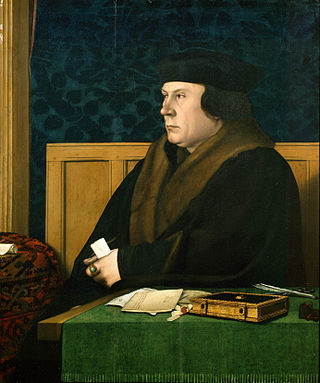Related Research Articles

Thomas Cromwell, briefly Earl of Essex, was an English statesman and lawyer who served as chief minister to King Henry VIII from 1534 to 1540, when he was beheaded on orders of the king, who later blamed false charges for the execution.

Edmund Bonner was Bishop of London from 1539 to 1549 and again from 1553 to 1559. Initially an instrumental figure in the schism of Henry VIII from Rome, he was antagonised by the Protestant reforms introduced by the Duke of Somerset and reconciled himself to Catholicism. He became notorious as "Bloody Bonner" for his role in the persecution of heretics under the Catholic government of Mary I of England, and ended his life as a prisoner under Queen Elizabeth I.
Thomas Thirlby, was the first and only bishop of Westminster (1540–50), and afterwards successively bishop of Norwich (1550–54) and bishop of Ely (1554–59). While he acquiesced in the Henrician schism, with its rejection in principle of the Roman papacy, he remained otherwise loyal to the doctrine of the Roman Catholic Church during the English Reformation.
Bishop Rowland Lee was an English clergyman who served as Bishop of Coventry and Lichfield 1534–43 and also as Lord President of the Marches under King Henry VIII.

The Dean of St Patrick's Cathedral is the senior cleric of the Protestant St Patrick's Cathedral, Dublin, elected by the chapter of the cathedral. The office was created in 1219 or 1220, by one of several charters granted to the cathedral by Archbishop Henry de Loundres between 1218 and 1220.
Nicholas Shaxton was Bishop of Salisbury. For a time, he had been a Reformer, but recanted this position, returning to the Roman faith. Under Henry VIII, he attempted to persuade other Protestant leaders to also recant. Under Mary I, he took part in several heresy trials of those who became Protestant martyrs.
Richard Sampson was an English clergyman and composer of sacred music, who was Anglican bishop of Chichester and subsequently of Coventry and Lichfield.
Events from the 1530s in England.
Richard Nykke became bishop of Norwich under Pope Alexander VI in 1515. Norwich at this time was the second-largest conurbation in England, after London.

Sir John Tregonwell was a Cornish jurist, a principal agent of Henry VIII and Thomas Cromwell in the Dissolution of the Monasteries. He served as Judge of the High Court of Admiralty from 1524 to 1536.
Richard Layton (1500?–1544) was an English churchman, jurist and diplomat, dean of York and a principal agent of Henry VIII and Thomas Cromwell in the Dissolution of the Monasteries.
William Benson was an English Benedictine, the last Abbot of Westminster and first Dean of Westminster. He was a friend of Thomas Cranmer, and belonged to the evangelical circle around Cranmer that included Thomas Goodrich, Hugh Latimer and Thomas Thirlby.
Edward Lee was Archbishop of York from 1531 until his death.
Dr Richard Gwent was a senior ecclesiastical jurist, pluralist cleric and administrator through the period of the Dissolution of the Monasteries under Henry VIII. Of south Welsh origins, as a Doctor of both laws in the University of Oxford he rose swiftly to become Dean of the Arches and Archdeacon of London and of Brecon, and later of Huntingdon. He became an important figure in the operations of Thomas Cromwell, was a witness to Thomas Cranmer's private protestation on becoming Archbishop of Canterbury, and was Cranmer's Commissary and legal draftsman. He was an advocate on behalf of Katherine of Aragon in the proceedings against her, and helped to deliver the decree of annulment against Anne of Cleves.
John Barber was an English clergyman and civilian.

Simon Haynes or Heynes was Dean of Exeter, Ambassador to France, and a signatory of the decree that invalidated the marriage of Henry VIII with Anne of Cleves. He became President of Queens' College at the University of Cambridge from 1529 to 1537, and toward the end of his life, was installed Canon of Windsor at Windsor Castle.
Richard Woleman or Wolman was an English churchman, Archdeacon of Sudbury from 1522; and the Dean of Wells between 1529 and 1537.
John London, DCL was Warden of New College, Oxford, and a prominent figure in the Dissolution of the Monasteries during the reign of Henry VIII of England.
Thomas Swinnerton was an evangelical preacher and author during the English Reformation.
Nicholas Hawkins, LL.D. (c.1495–1534) was an English cleric and diplomat.
References
- ↑ MacCulloch, Diarmaid (2018). Thomas Cromwell : a life. London: Allen Lane. p. 273. ISBN 9780141967660.
- ↑ Martin 1885, pp. 120, 121.
- ↑ British History On-line
- ↑ "Alumni Oxonienses 1500-1714". British History Online. Retrieved 23 May 2012.
- 1 2 3 4 Martin 1885, p. 120.
- Attribution
![]() This article incorporates text from a publication now in the public domain : Martin, Charles Trice (1885). "Bedyll, Thomas". In Stephen, Leslie (ed.). Dictionary of National Biography . Vol. 3. London: Smith, Elder & Co. pp. 120, 121.
This article incorporates text from a publication now in the public domain : Martin, Charles Trice (1885). "Bedyll, Thomas". In Stephen, Leslie (ed.). Dictionary of National Biography . Vol. 3. London: Smith, Elder & Co. pp. 120, 121.